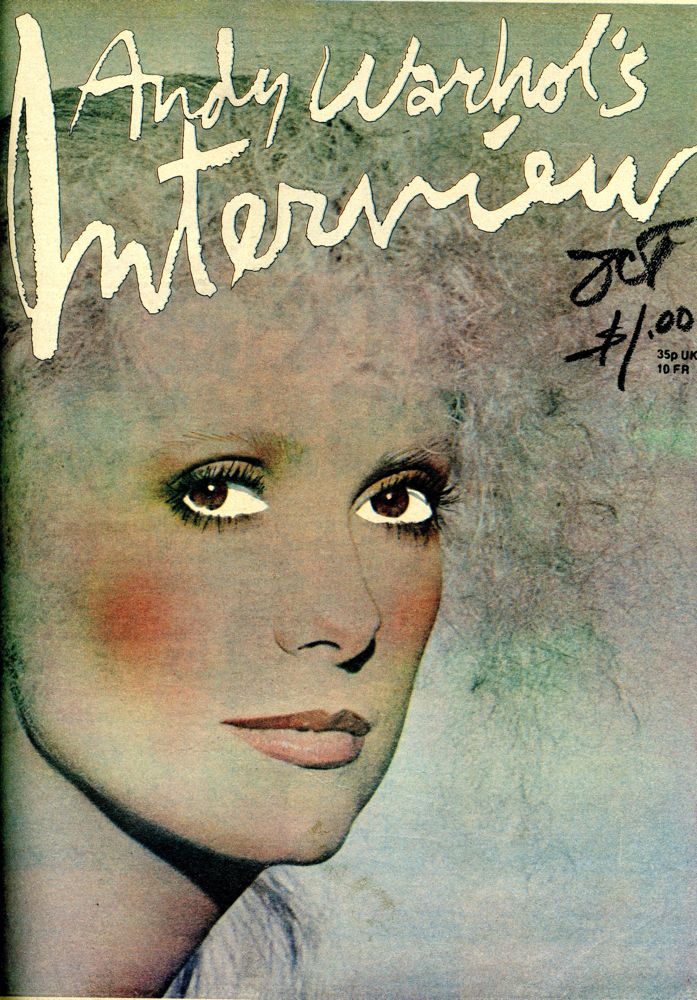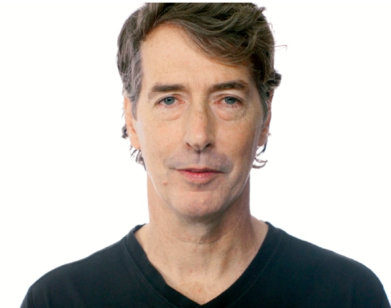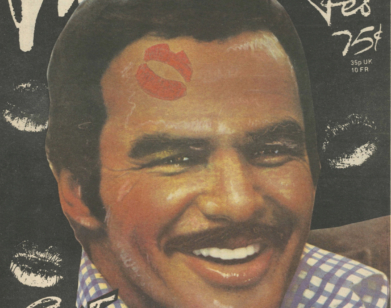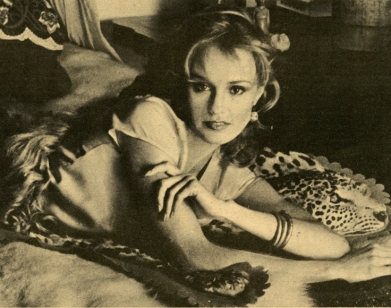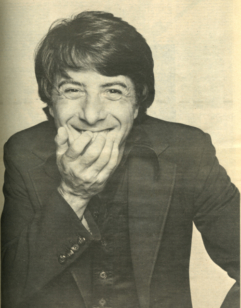The Eternally Obliging Catherine Deneuve
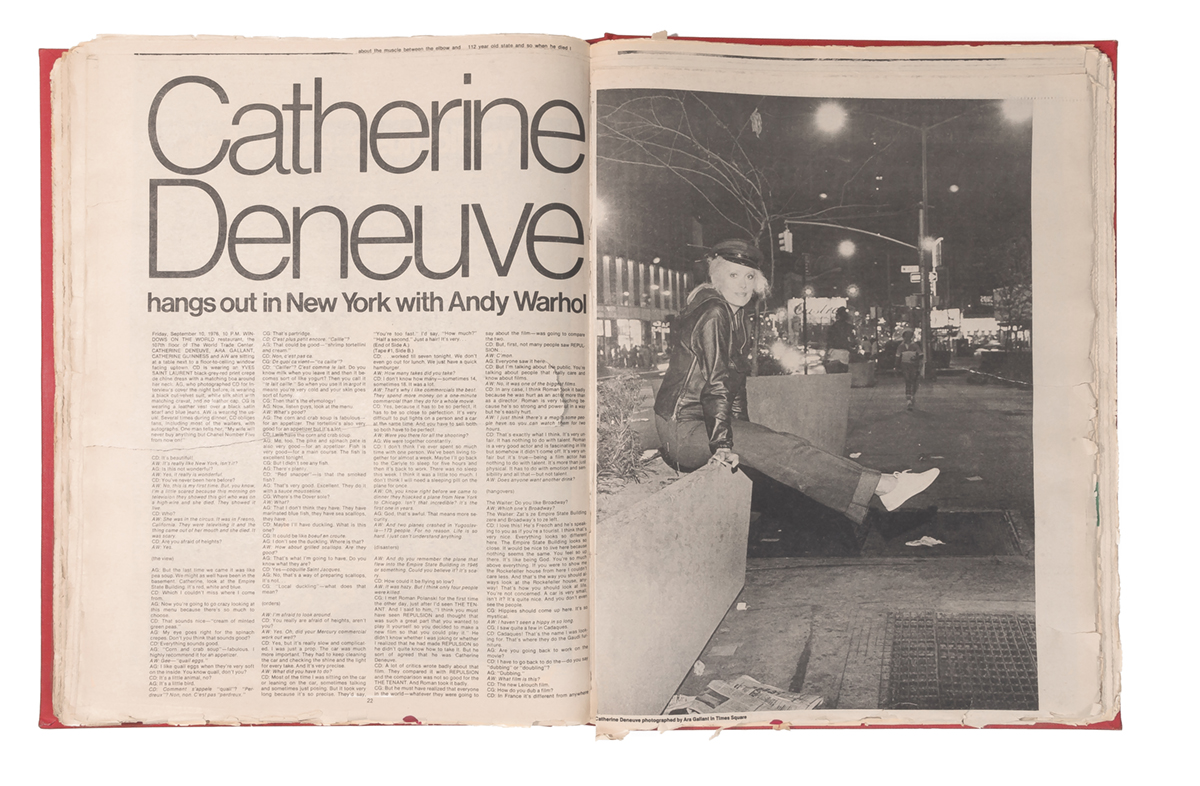
This story is part of a collection celebrating the best—and wildest—Warhol conversations from the Interview archives.
Friday, September 10, 1976, 10 p.m. Windows on the World restaurant, the 107th floor of the World Trade Center. Catherine Deneuve, Ara Gallant, Catherine Guinness, and Andy Warhol are sitting at a table next to a floor-to-ceiling window facing uptown. Deneuve is wearing an Yves Saint Laurent black-grey-red print crêpe de chine dress with a matching boa around her neck. Gallant, who photographed Deneuve for Interview’s cover the night before, is wearing a black cut-velvet suit, white silk shirt with matching cravat, and no leather cap. Guinness is wearing a leather vest over a black satin scarf and blue jeans. Warhol is wearing the usual. Several times during dinner, Deneuve obliges fans, including most of the waiters, with autographs. One man tells her, “My wife will never wear anything but Chanel Number Five from now on!”
———
CATHERINE DENEUVE: It’s beautiful!
ANDY WARHOL: It’s really like New York, isn’t it?
ARA GALLANT: Is this not wonderful?
WARHOL: Yes, it really is wonderful.
DENEUVE: You’ve never been here before?
WARHOL: No, this is my first time. But, you know, I’m a little scared because this morning on television they showed this girl who was on a high-wire and she died. They showed it live.
DENEUVE: Who?
WARHOL: She was in the circus. It was in Fresno, California. They were televising it and the thing came out of her mouth and she died. It was scary.
DENEUVE: Are you afraid of heights?
WARHOL: Yes.
GALLANT: But the last time we came it was like pea soup. We might as well have been in the basement. Catherine, look at the Empire State Building. It’s red, white, and blue.
DENEUVE: Which I couldn’t miss where I come from.
GALLANT: Now you’re going to go crazy looking at this menu because there’s so much to choose.
DENEUVE: That sounds nice— “cream of minted green peas.”
GALLANT: My eye goes right for the spinach crepes. Don’t you think that sounds good?
DENEUVE: Everything sounds good.
GALLANT: “Corn and crab soup”—fabulous. I highly recommend it for an appetizer.
WARHOL: Gee—”quail eggs.”
GALLANT: I like quail eggs when they’re very soft on the inside. You know quail, don’t you?
DENEUVE: It’s a little animal, no?
GALLANT: It’s a little bird.
DENEUVE: Comment s’appelle “quail”? “Perdreux”? Non, non. C’est pas “perdreux.”
GUINNESS: That’s partridge.
DENEUVE: C’est plus petit encore. “Caille”?
GALLANT: That could be good—”shrimp tortellini and cream.”
DENEUVE: Non, ce n’est pas ça.
GUINNESS: De quoi ça vient—”ça caille”?
DENEUVE: “Cailler”? C’est comme le lait. Do you know milk when you leave it and then it becomes sort of like yogurt? Then you call it “le lait caille.” So when you use it in argot it means you’re very cold and your skin goes sort of funny.
GUINNESS: Then that’s the etymology!
GALLANT: Now, listen guys, look at the menu.
WARHOL: What’s good?
GALLANT: The corn and crab soup is fabulous—for an appetizer. The tortellini’s also very good for an appetizer but it’s a lot.
DENEUVE: I will have the corn and crab soup.
GALLANT. Me, too. The pike and spinach plate is also very good—for an appetizer. Fish is very good—for a main course. The fish is excellent tonight.
GUINNESS: But I didn’t see any fish.
GALLANT: There’s plenty.
DENEUVE: “Red snapper” —is that the smoked fish?
GALLANT: That’s very good. Excellent. They do it with a sauce mousseline.
GUINNESS: Where’s the Dover sole?
WARHOL: What?
GALLANT: That, I don’t think they have. They have marinated blue fish, they have sea scallops, they have…
DENEUVE: Maybe I’ll have duckling. What is this one?
GUINNESS: It could be like boeuf en croute.
GALLANT: I don’t see the duckling. Where is that?
WARHOL: How about grilled scallops. Are they good?
GALLANT: That’s what I’m going to have. Do you know what they are?
DENEUVE: Yes—coquilles Saint Jacques.
GALLANT: No, that’s a way of preparing scallops, it’s not…
GUINNESS: “Local duckling”—what does that mean?
[everyone orders]
WARHOL: I’m afraid to look around.
DENEUVE: You really are afraid of heights, aren’t you?
WARHOL: Yes. Oh, did your Mercury commercial work out well?
DENEUVE: Yes, but it’s really slow and complicated. I was just a prop. The car was much more important. They had to keep cleaning the car and checking the shine and the light for every take. And it’s very precise.
WARHOL: What did you have to do?
DENEUVE: Most of the time I was sitting on the car or leaning on the car, sometimes talking and sometimes just posing. But it took very long because it’s so precise. They’d say, “You’re too fast.” I’d say, “How much?” “Half a second.” Just a hair! It’s very…
[tape ends]
DENEUVE: … Worked ’til seven tonight. We don’t even go out for lunch. We just have a quick hamburger.
WARHOL: How many takes did you take?
DENEUVE: I don’t know how many—sometimes 14, sometimes 18. It was a lot.
WARHOL: That’s why I like commercials the best. They spend more money on a one-minute commercial than they do for a whole movie.
DENEUVE: Yes, because it has to be so perfect, it has to be so close to perfection. It’s very difficult to put lights on a person and a car at the same time. And you have to sell both so both have to be perfect.
WARHOL: Were you there at all for the shooting?
GALLANT: We were together constantly.
DENEUVE: I don’t think I’ve ever spent so much time with one person. We’ve been living together for almost a week. Maybe I’ll go back to the Carlyle to sleep for five hours and then it’s back to work. There was no sleep this week. I think it was a little too much. I don’t think I will need a sleeping pill on the plane for once.
WARHOL: Oh, you know right before we came to dinner they hijacked a plane from New York to Chicago. Isn’t that incredible? It’s the first one in years.
GALLANT: God, that’s awful. That means more security.
WARHOL: And two planes crashed in Yugoslavia—173 people. For no reason. Life is so hard. I just can’t understand anything. And do you remember the plane that flew into the Empire State building in 1946 or something. Could you believe it? It’s scary.
DENEUVE: How could it be flying so low?
WARHOL: It was hazy. But I think only four people were killed.
GUINNESS: I met Roman Polanski for the first time the other day, just after I’d seen The Tenant. And I said to him, “I think you must have seen Repulsion and thought that was such a great part that you wanted to play it yourself so you decided to make a new film so that you could play it.” He didn’t know whether I was joking or whether I realized that he had made Repulsion so he didn’t quite know how to take it. But he sort of agreed that he was Catherine Deneuve.
DENEUVE: A lot of critics wrote badly about that film. They compared it with Repulsion and the comparison was not so good for The Tenant. And Roman took it badly.
GUINNESS: But he must have realized that everyone in the world—whatever they were going to say about the film—was going to compare the two.
DENEUVE: But first, not many people saw Repulsion…
WARHOL: C’mon.
GALLANT: Everyone saw it here.
DENEUVE: But I’m talking about the public. You’re talking about people that really care and know about films.
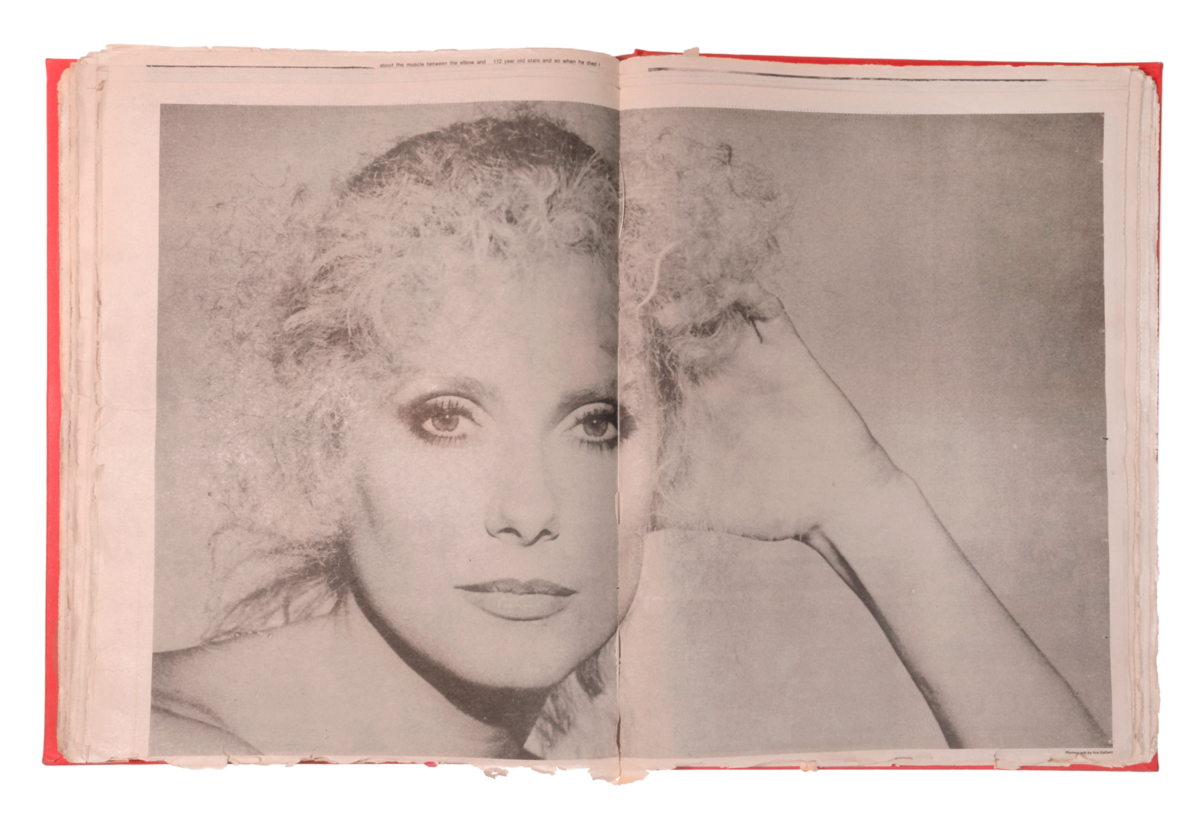
WARHOL: No, it was one of the biggest films.
DENEUVE: In any case, I think Roman took it badly because he was hurt as an actor more than as a director. Roman is very touching because he’s so strong and powerful in a way but he’s easily hurt.
WARHOL: I just think there’s a magic some people have so you can watch them for two hours.
DENEUVE: That’s exactly what I think. It’s very unfair. It has nothing to do with talent. Roman is a very good actor and is fascinating in life but somehow it didn’t come off. It’s very unfair but it’s true—being a film actor has nothing to do with talent. It’s more than just physical. It has to do with emotion and sensibility and all that—but not talent.
WARHOL: Does anyone want another drink?
THE WAITER: Do you like Broadway?
WARHOL: Which one’s Broadway?
WAITER: Zat’s ze Empire State Building zere and Broadway’s to ze left.
DENEUVE: I love this! He’s French and he’s speaking to you as if you’re a tourist. I think that’s very nice. The Empire State Building looks so close. It would be nice to live here because nothing seems the same. You feel so up there. It’s like being God. You’re so much above everything. If you were to show me the Rockefeller house from here I couldn’t care less. And that’s the way you should always look at the Rockefeller house, anyway! That’s how you shold look at life. You’re not concerned. A car is very small, isn’t it? It’s quite nice. And you don’t even see the people.
GUINNESS: Hippies should come up here. It’s so mystical.
WARHOL: I haven’t seen a hippie in so long.
GUINNESS: I saw quite a few in Cadaques.
DENEUVE: Cadaques! That’s the name I was looking for. That’s where they do the Gaudi furniture.
GALLANT: Are you going back to work on the movie?
DENEUVE: I have to go back to do the—do you say “dubbing” or “doubling”?
GALLANT: “Dubbing.”
WARHOL: What film is this?
DENEUVE: The new Lelouch film.
GUINNESS: How do you dub a film?
DENEUVE: In France it’s different from anywhere else. In America they give you earphones and you hear a strange little noise, “beeb-beeb-beeb-beeb-beeb-beeb-beeb,” and little flashing lights. And when they stop you have to talk. In Italy things are much easier. They don’t even have flashing lights. You just talk. But in France we have everything written out and there’s a sort of black line under the words. When the first word reaches the line, you start.
GUINNESS: That’s much better. But in the American way, with the “beeb-beeb,” what happens if you finish talking before the mouth of the person on the screen stops?
DENEUVE: You have to do it again!
[discussion of subtitles]
DENEUVE: Very good fish.
GALLANT: Excellent.
DENEUVE: And the zucchini is very good.
GALLANT: Fabulous zucchini.
DENEUVE: It’s very delicate. I don’t know how it’s possible to make this kind of food for so many people.
WARHOL: I can’t understand it either. But it’s still not as good as in Paris.
DENEUVE: But it’s a very good…
[tape ends]
WARHOL: I love the way people eat in commercials. They shove food in their mouth but it’s so beautiful to watch. I don’t know what they do. Like the little boy who’s run away from home because he stole the cake and then the policeman comes up to him— I don’t know if you’ve seen this one—and then he takes a bite of the cake and he just… oh, it makes it look like the best thing in the world.
DENEUVE: It must be very difficult to do. They must spend days doing it. They must be so sick at the end of the day.
WARHOL: Oh, I know. It’s really work. But it looks so great.
DENEUVE: Recently I had to eat chicken all morning. I couldn’t think about chicken for weeks.
WARHOL: Do people in America know you more for Chanel than for movies?
DENEUVE: Yes.
WARHOL: It’s strange.
DENEUVE: No, it’s normal. You can’t miss it.
WARHOL: It is the best commercial I’ve ever seen.
DENEUVE: That’s the feeling I have. I say it’s normal. I don’t mind, to tell you the truth.
WARHOL: Are you going to do another one this year?
DENEUVE: I don’t know yet. Maybe. I think it’s fair. I think at one moment things come out the way they have to. It’s the best thing that wins. I think Chanel is the best commercial so it’s normal that that’s what I’m known for. And also it’s on television. You can’t compete with television commercials!
WARHOL: You haven’t made many movies here, have you?
DENEUVE: Only two. I’m going to try once more.
GALLANT: Three times and you’re out.
DENEUVE: And then it’s a wrap! I’m going to do a film with Dick Richards who did Farewell, My Lovely, no? It’s about the Foreign Legion in Madrid. Gene Hackman is in it and Terence Hill and several others—only men. I’m the only woman.
WARHOL: Did you have fun with Lester Persky the other night?
DENEUVE: You mean here in town? Yes, it was fun.
WARHOL: He started the hour-long commercial. Did you know that? They were really big in the ’50s. Do you remember Tupperware?
GALLANT: And Melmac?
WARHOL: And Melmac? They had Virginia Graham showing you all the ways you could use Melmac for a whole hour. And he discovered Rock Hudson. For a whole hour they had Rock Hudson showing you all the ways you could use Hoover vacuum cleaners.
DENEUVE: Imagine how long it must have taken when you think of all the trouble it takes just for a four-minute commercial!
WARHOL: And then the hour-long commercial went out. That’s when I met Lester. He went around selling our first movie. And I did my first book in his apartment, called A. He is really good friends with Tennessee Williams. Lester’s always been fun. He gave the best party in the ’60s at my studio. He wanted me to invite 50 beautiful people and he would invite Judy Garland and Montgomery Clift and several other people that died. It was so great. Judy Garland came in and nobody paid any attention to her. It was so crazy. And then after the party they all went to Lester’s house for spaghetti and they had Johnny Nicholson over there serving spaghetti and Judy Garland serving spaghetti, singing “Over the Rainbow.” Juliet Prowse, who had just broken up with Frank Sinatra, was there and Montgomery Clift, who was feeling so blue. It was nutty. Lester really, really is funny. I think he could be one of the best comedians.
GALLANT: He really could. Can I tell you a funny story about Bloomingale’s? I’ve been laughing about it for…
[tape ends]
GALLANT: Really a New York story. Catherine went into Bloomingdale’s to buy something and, as she was standing at the counter, she saw this rather well dressed man lying on the floor, rummaging around, looking up her dress!
WARHOL: No! Are you serious?
GALLANT: And she thinks he dropped something on the floor so she looks down and smiles at him, which he probably took as some kind of come-on.
WARHOL: On the floor?
DENEUVE: He was a very nice man with a mustache. After a while I realized he wasn’t trying to find anything. I didn’t say anything because I felt so embarrassed for him.
GALLANT: That wouldn’t happen in Paris, would it? I think that could only happen in New York.
WARHOL: This is a whole new view. I can’t look down. It’s scary. Can you get an apartment up here?
DENEUVE: I wouldn’t want to. I couldn’t live in it.
WARHOL: I couldn’t either. It’s too abstract for me.
Redacted by Chris Hemphill
THIS ARTICLE INTIALLY APPEARED IN THE OCTOBER 1976 ISSUE OF INTERVIEW.
———
Read more stories from the Celebrating Warhol collection.

